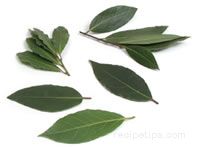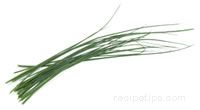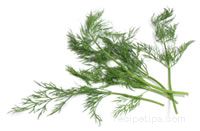The definition of seasoning is to enhance flavor with herbs, spice, & citrus
Herbs
Herb is the generic name given to hundreds of plants that have fragrant leaves and stems used to season foods. Herbs can be used fresh or they can be dried, but the quantity that is best used in a recipe may vary greatly depending on which type is used. Most dried herbs can be stored for several months, but they quickly lose their flavor if kept too long. There are many different types of herbs, but some commonly available are: basil, bay leaves, chives, and dill. |
|
Basil  |
A leafy, green herb, belonging to the mint family, with an intense flavor that is a staple in Mediterranean cooking. Basil can be dried and used during months when it may not be available in some regions, but it is best when used fresh, as it will provide peak flavor. |
| Food Complements: |
Ripe tomatoes, soft cheese, soups, stews, beef, fish, veal, lamb, poultry, eggs, pizza, vegetables, mixed with vinegars to create dressings, a principal ingredient in pesto, sprinkled over salad or pasta, and mixed with tea. Also added to fresh fruit desserts. |
| Tips: |
Extended exposure to heat diminishes the basils distinct flavor. Dried basil can withstand longer cooking times.
When using fresh basil leaves, rather than dried basil, it is best to add toward the end of cooking.
Mix with mayonnaise to taste. Use as a dressing for burgers and sandwiches. Mixture can also be brushed on chicken or fish before grilling/roasting/broiling.
Blend with softened butter and garlic to taste. Brush onto grilled/broiled French bread or use to sauté your favorite vegetables, seafood, or poultry. Can also be added to mashed potatoes.
|
|
Bay Leaves  |
Aromatic leaves from the evergreen bay laurel tree used for seasoning. The tree is native to Mediterranean regions and the leaves that are harvested are usually dried before being sold. |
| Food Complements: |
The leaves provide rich flavoring to many meat dishes, soups, and stews with only one or two necessary for many recipes.
Other food complements: fish, meats, vegetables, soups, stews, marinades, sauces, tomato dishes, pickle recipes, custards, Cajun gumbos, and a principal ingredient in bouguet garni. |
| Tips: |
The bay leaves are usually removed before the dish is served.
Blend with orange zest to make an excellent rub for beef.
Blend with lemon zest to make an excellent rub for fish. |
|
Chives  |
A type of plant characterized by long green shoots that is used as an herb and has a flavor very similar to an onion. Although dried chives are available, they are best as an ingredient when they are fresh. Regular chives are also considered to be European chives, which provide a mild onion flavor to foods. Another common chive is the Garlic chive, which is also referred to as the Chinese chive. As can be assumed by the name, the Garlic chive provides a noticeable flavor of garlic. |
| Food Complements: |
Chives provide a mild onion flavoring to dishes including poultry, fish, eggs, potatoes, dips, pasta salads, tomato soup, and lettuce salads. Chives can be added to herbal vinegar to be used as a dressing, or dishes containing soft cheeses. |
| Tips: |
The shoots should be snipped with a scissors right before they will be used so that they retain their flavor and crispness. If cut prior to being prepared, store them in a refrigerator and prepare within a few days.
Add to softened butter or cream cheese as a spread for bagels and breads.
Add to sour cream for a wonderful dip for crackers and chips, or topping for a baked potato.
Use as a tie while steaming/grilling asparagus bundles.
The edible blossoms make beautiful garnishments. |
|
Dill  |
An herb belonging to the parsley family with fine, feathery leaves. Like most herbs, dill has the best flavor when used fresh, but dried dill is often used when fresh is not available. |
| Food Complements: |
Dill is used in many dishes, but it works especially well with fish recipes.
Other food complements: cucumbers (pickles), mild cheeses, eggs, vegetables, cream sauces, potatoes, lettuce/pasta salads, cold soups, breads, rice dishes, marinades, and stuffing recipes. |
| Tips: |
Dill can be used as an attractive garnish.
Add to softened cream cheese and chives for a tasty bagel spread.
Soak dill seeds in vinegar 3 to 4 days to create a zippy dressing.
Blended with melted butter, dill is the perfect dip for your favorite grilled or broiled fish/seafood. |
|




